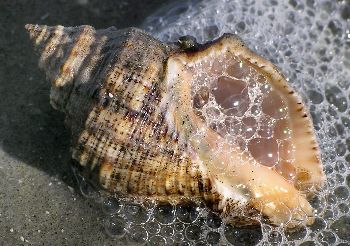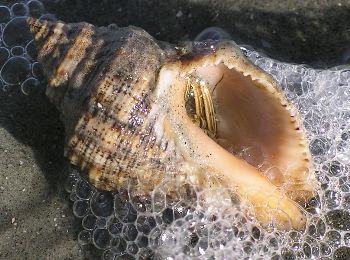April, 2018
Things I Learned When I Was a Kid
by Valerie
As everyone knows, childhood is a period in which we come to understand enough about the world around us that we can make it to adulthood without doing stupid things that will jeopardize our survival. We, of course, learn the important basics, such as how to hold a sharp knife without cutting our skin, that heavy rocks should not be dropped on one's foot, why we do not talk back to our elders, and the technique for crossing a street without being smashed flat by a truck. While parents often assist in the most important lessons, those that will keep us relatively safe from trauma and death, innumerable other details about our environment are revealed as we explore on our own.
Much of the knowledge we gain through engaging with our surroundings, though, is not particularly essential for our continued existence, but has more to do with all the other stuff that makes up life. The large brains that distinguish us from other animals are capable of absorbing the results of countless actions and their subsequent reactions, all the while contributing to our knowledge base about interactions in general.
 Some consequences are realized through rather painful episodes, both physically and emotionally. At a very early age, I found out that grasshoppers and dragonflies bite quite hard if not handled correctly. There is a proper technique for catching the crayfish and hellgrammites that my father used as fishing bait, which conveniently avoids their pincers and jaws. I had not known that the spines on bristleworms break off and deliver an agonizing sting until I picked one up while snorkeling in the Florida Keys. Needless to say, I never made THAT mistake again. When a cat lives in the same house as a baby turtle, the latter does not do very well when they encounter each other. The same outcome accompanies the meeting of a foraging raccoon and a large pet turtle in an outdoor pond. And everyone knows what happens when a beloved dog unwittingly tries to cross a road by itself.
Some consequences are realized through rather painful episodes, both physically and emotionally. At a very early age, I found out that grasshoppers and dragonflies bite quite hard if not handled correctly. There is a proper technique for catching the crayfish and hellgrammites that my father used as fishing bait, which conveniently avoids their pincers and jaws. I had not known that the spines on bristleworms break off and deliver an agonizing sting until I picked one up while snorkeling in the Florida Keys. Needless to say, I never made THAT mistake again. When a cat lives in the same house as a baby turtle, the latter does not do very well when they encounter each other. The same outcome accompanies the meeting of a foraging raccoon and a large pet turtle in an outdoor pond. And everyone knows what happens when a beloved dog unwittingly tries to cross a road by itself.
Beyond the sometimes upsetting events that seem to burn themselves into our memories, there are far more experiences of lesser significance which contribute to our perception and interpretation of our surroundings, whether it is about relationships with friends and family, dealing with the academic environment at school, or mastering the rules of society in general. While my participation in the aforementioned circumstances was pretty much the same as everyone else's, I also spent a LOT of time outdoors when I was young, often on my own as I roamed the woods, fields and wastelands around our house, played in creeks and ponds while waiting for my parents to return from fishing or mushroom hunting, or went on extended hikes, canoe and camping trips.
Many of the things I learned in childhood are not particularly essential to life, but, as with many aspects of our existence, just make it more appealing. A person can survive without art, beauty and humor, but, then, it's just surviving. So here are some of the less-than-essential factoids that I discovered in my childhood:
- Seashells found on the beach are likely to still contain organic matter inside and should not be packed in luggage for the trip home.
- Catfish roe does not taste like caviar, which supposedly tastes good.
- Horsehair worms do not make good aquarium pets because they die in short order.

- Dragonfly nymphs do not make good aquarium pets because they emerge as adults and fly around the house.
- Small snakes are nearly impossible to keep confined in their cages.
- Baby goldfish are dark colored then turn orange in a matter of days.
- A cow's tongue feels like super-rough sandpaper.
- Mudpuppies bite, but their teeth feel like a cow's tongue.
- A honey bee's stinger pulses all by itself after being stuck in a toe and is better removed quickly before more venom is injected.
- If a house centipede crawls up your pant leg, don't whack it because all the legs will fall off.
- Pillbugs are crustaceans and turn red when you cook them.
- Baby gars grow very quickly in an aquarium, as they eat all the other fish.
- Catching one harvestman unharmed is difficult, but grabbing a whole handful when they are clustered under a ledge is easy.
- The best fertilizers for flowers and vegetables are human blood and fish guts.
- Microscopes were designed for things more transparent than fossil shark teeth.
- Drinking spring water issuing from a pipe with planarians living in it will not make you sick.
Perhaps one of the most important lessons learned in my early childhood was that the innumerable creatures that live around us are not frightening. I've seen adults recoil unnecessarily in horror at the sight of a snake, spider, wasp or roach. Nighttime in a forest is not the dark and forbidding place of Grimm's fairytales but a fascinating landscape full of wondrous surprises. Caves, meadows, mountaintops, the seashore and even small urban wild spaces are full of potential discoveries. As large-brained primates, curiosity is one of our most valuable assets. If that trait ever did 'kill the cat' then at least the beast did not die of boredom.
 Some consequences are realized through rather painful episodes, both physically and emotionally. At a very early age, I found out that grasshoppers and dragonflies bite quite hard if not handled correctly. There is a proper technique for catching the crayfish and hellgrammites that my father used as fishing bait, which conveniently avoids their pincers and jaws. I had not known that the spines on bristleworms break off and deliver an agonizing sting until I picked one up while snorkeling in the Florida Keys. Needless to say, I never made THAT mistake again. When a cat lives in the same house as a baby turtle, the latter does not do very well when they encounter each other. The same outcome accompanies the meeting of a foraging raccoon and a large pet turtle in an outdoor pond. And everyone knows what happens when a beloved dog unwittingly tries to cross a road by itself.
Some consequences are realized through rather painful episodes, both physically and emotionally. At a very early age, I found out that grasshoppers and dragonflies bite quite hard if not handled correctly. There is a proper technique for catching the crayfish and hellgrammites that my father used as fishing bait, which conveniently avoids their pincers and jaws. I had not known that the spines on bristleworms break off and deliver an agonizing sting until I picked one up while snorkeling in the Florida Keys. Needless to say, I never made THAT mistake again. When a cat lives in the same house as a baby turtle, the latter does not do very well when they encounter each other. The same outcome accompanies the meeting of a foraging raccoon and a large pet turtle in an outdoor pond. And everyone knows what happens when a beloved dog unwittingly tries to cross a road by itself.
